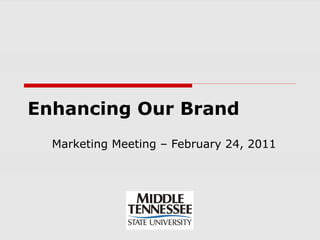2012.presentation
- 1. Enhancing Our Brand Marketing Meeting â February 24, 2011
- 2. What is this thing we call a Brand? ïŊ Is it a look or logo? A name, product line or service? ïŊ Is it something that provides an emotional connection and helps consumers cut through marketplace clutter? ïŊ Itâs not an abstract concept. It is our single greatest assetâĶ.the reason why people choose us over any other product.
- 3. Branding 101 ïŊ Brands are built by peopleâĶ..not by logos or advertising. ïŊ Strong Brands arenât built in a day, week or month. It takes years. ïŊ Brands are about promises and trust. ïŊ Strong Brands help guide executive decision-making.
- 4. Why Is Building a Brand so Important? ïŊ To differentiate you from your competition. ïŊ To create value. ïŊ To get buy in from your entire community â âbottom up.â
- 5. The Value of Building a Brand ââĶIn the factory we make cosmetics, in the store we sell hope.â -- Charles Revlon âIf all Coca Cola's assets were destroyed overnight , whoever owned the Coca Cola name could walk into a bank the next morning and get a loan to rebuild everything.â -- Carlton Curtis VP Corporate Communications, Coca Cola
- 6. Starbucks ïŊ Founded in 1971 at Seattleâs Pike Place Market. ïŊ In 25 years, grew from 18 stores to 9,671. ïŊ Known for attention to detail and its hip environment. ïŊ Starbucks Chairman, Howard Schultz says heâs not in the coffee business serving people. Heâs in the people business serving coffee.
- 7. Is a Cup of Coffee Really Worth $5? âThe product that will not sell without advertising will not sell profitably with advertising.â â Howard Schultz
- 8. Commitment from the âBottom â Upâ ïŊ In the first 25 years, Starbucks spent less than $20 million on traditional advertising. ïŊ Instead it plowed potential ad spending into employee benefits. ïŊ One of the first to offer part-time employees stock options and health benefits. ïŊ Why? Because the employee is crucial to the Starbucks experience.
- 9. Is a Cup of Coffee Really Worth $5? âIf we want to exceed the trust of our customers, then we first have to build trust with our people. A brand has to start with the culture and naturally extend to our customers.â -- Howard Schultz, Starbucks Chairman
- 10. Strong Brands have an Emotional Connection ïŊ The brand stands for something important to consumers. ïŊ The brand is intense and vibrant and connects with people on multiple levels and senses. ïŊ The brand is unique. ïŊ The brand is admirable. ïŊ The brand consistently interacts and never disappoints. ïŊ The brand makes them feel good.
- 11. Great Brands ïŊ Great brands are not viewed as commodities. ïŊ Great brands deliver against a promise. ïŊ Great brands create strong word of mouth. ïŊ Great brands convey value systems. ïŊ Great brands know how far the brand can stretch. ïŊ Great brands create relationships. ïŊ Great brands forge emotional connections. ïŊ Great brands really know their consumers.
- 12. Great Brands Do we want to be a Great Brand?
- 14. Finding Our Focus WHO ARE We?
- 15. Great Brands Stand for One Thing Maytag Freedom Volvo Thinking Differently Disney Overnight, No Excuses Nike Safety Harley Magic Apple Dependability FedEx Quality Footware
- 16. Great Brands Stand for One Thing Maytag Dependability Volvo Safety Disney Magic Nike Quality Footware Harley Freedom Apple Thinking Differently FedEx Overnight, No Excuses
- 18. IâM One -- the Brand Promise ïŊ Simply put being Tennessee's Best is a goal for MTSU to recruit the best students, retain the best faculty, and being committed to enhancing academic quality and a student- centered environment; two pillar of our academic master plan. As President McPhee said when the campaign was officially initiated at the Fall Faculty meeting, the IâM ONE campaign is designed to recognize the important role each individual plays in helping students reach their full potential.
- 19. ïŊ Why did IâM One âworkâ in Admissions and did not continue to resonate across campus?
- 20. ïŊ Do we want to develop an Ad Campaign that may have a âlifespanâ of 1-2 years? ïŊ Or do we want to develop a Marketing Campaign that will embrace âwho we areâ and a âBrand Promiseâ that will serve the University for years & years?





















